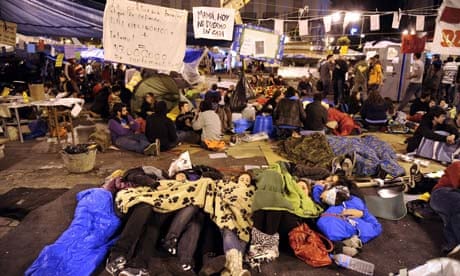Thousands of protesters who are camped out in Madrid's central Puerta del Sol square and in dozens more Spanish cities have pledged to defy an order to pack up their tent cities and leave.
As the country's electoral authorities ordered them to move by midnight on Friday, claiming they would disturb Sunday's municipal and regional elections, organisers called a special silent protest for first thing on Saturday morning.
A tense standoff between police and protesters looked inevitable as interior minister Alfredo Pérez Rubalcaba warned that authorities would uphold the law.
"Police know exactly what they have to do," he said, without specifying. "Their actions will depend on what happens."
"We are expecting some kind of attempt to get rid of us," warned organisers in southern Seville, where several hundred people were also camped out in a city square.
But protesters claimed their "silent" demonstration in Madrid on Saturday would not break rules preventing campaigning on the day before an election.
More than 10,000 people had gathered in the small hours of Friday morning in support of the campers who first appeared in the Puerta del Sol square on Sunday.
Up to a thousand more spent the night in tents or sleeping out on mattresses, sofas, armchairs and other furniture wheeled out into a very well-run camp. Volunteers had organised themselves into clean-up crews, catering groups, a legal department, a press office and a first aid centre under a tarpaulin-covered part of the square. Many brought tents and sleeping bags. Four portable toilets had apparently been donated by a sympathetic building company.
Organisers asked people not to donate more food as everything from sandwiches to fruit was passed around by volunteers. "This is a demonstration, not a party," read some signs as cans of beer were passed around.
The strong organisation contrasted with confusion about the protesters' aims. Protesters' committees held open assemblies to debate proposals covering issues from electoral reform to animal rights. A general assembly saw almost a thousand people sitting out in the sun for hours on Thursday afternoon, many decked with homemade paper hats, to listen to the reports on the previous day's debates.
The biggest cheers came for proposals to tackle corruption, reduce political perks and reform an electoral system that favours a two-party system in the national parliament. "This isn't about left or right. It isn't even a political movement," said protester Juan Martin, a 22-year-old carpenter. "It is about a better society."
"And if we can do this here, then we need it even more urgently in Italy," said Italian journalism student Sara D'Eustacchio, who joined the Madrid camp.
She said Facebook and Twitter were being used to export the so-called "Spanish Revolution" movement to the rest of Europe, with a dozen similar protests being planned in Italy. Protesters had gathered outside the Spanish embassy in London on Thursday.
It was not clear when the peaceful protests would end, with Madrid organisers insisting that the camp-out – advertised with "Yes, we camp!" signs, echoing Barack Obama's campaign slogan – would continue on Saturday.
"We will continue with the exercise of collective reflection between all those attending the spontaneous meetings to have emerged in recent days," they said.
Authorities in Barcelona said they would not act against demonstrators there, as long as they remained peaceful.
The movement places the socialist government of Prime Minister José Luis Rodríguez Zapatero, which is already predicted to suffer serious defeat at Sunday's elections, in a difficult situation.
"We have to listen and be sensitive, because there are reasons why they are expressing their unhappiness and their criticism," Zapatero said on Thursday.
At the square, political parties and trades unions were clearly not welcome.
"Politicians can come here if they want, but we might not listen to them," said a protest spokesman named Jero. "There is no date for this to end."





